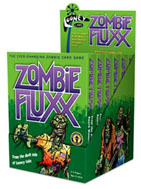
|
About OgreCave and its staff
|

|
by Mike Sugarbaker
This game is featured in our 2007 OgreCave Christmas Gift Guide Okay: first, I need to get some things on the record about Fluxx, out here in front of Google and everybody, rather than inside the podcast. Here's the thing: Fluxx catches a lot of hate on the Internet. I'm not completely sure why. It seems to be connected to the hardcore board gamer's pathological fear of and revulsion toward what they call "luck," which is not the mere presence of luck in the world (no game can be completely without luck, as Richard Garfield pointed out in an old Duelist column - if anyone from WotC is reading this, hey, put those online!), but any game mechanic that incorporates both of two things: 1) not knowing exactly what you are going to get from a game system, and 2) the source of that something being the game system, rather than a human decision on the part of another player. The possible sources of all that hate are both easy and boring to pontificate about, so I will just say this about Fluxx: if I went to a steakhouse, sat down and ordered a steak, and they brought me a plate of cotton candy, yes, I would be disappointed, even quite rightly angry. But if I then went around to people eating cotton candy at the state fair and told them how cotton candy is stupid and steak is the only real food, I would quite rightly be considered a moron. It's the 21st century, and failure to understand people who are different than you is not going to be a badge of pride much longer; start adjusting, if you haven't. Now, a few words about zombie games. As a critical category, the term "zombie games" does not comprise every game that has zombies as a central thematic element. Cheapass' Give Me The Brain and Lord of the Fries are wonderful games that feature zombies, but they are not zombie games for our purposes here. To be a zombie game, a game has to have gameplay elements involving overwhelming, implacably advancing threat elements. You have to be saying, "Oh $#!*, they're still coming," or else it isn't a zombie game. Zombie Fluxx is a zombie game, if not a perfect one. It is also still Fluxx to its core, and those two things may be working against each other. Because zombies can be almost anything at all, but they are nearly always dependable.
Gameplay The first new card type Zombie Fluxx introduces is Creepers: anti-Keepers, things that are very much not fine to have, but which you end up with a passel of anyway. When you draw a Creeper, it doesn't go into your hand; it goes immediately into play in front of you. (You draw a replacement card immediately, which does go into your hand, unless it's also a Creeper.) All the Creepers in Zombie Fluxx are, of course, Zombies. There are some rules differences keyed to the art on the cards - some cards move around the table in the direction the artwork points when one of their brethren is killed. The differences are mostly keyed to how many Zombies are pictured, which can also count for your total number of Zombies for some purposes, though this is not consistent (we sometimes had to guess whether total Zombies or total Creepers were intended). The second is particularly interesting and suggestive of future directions for Fluxx: the Ungoal, a Goal that, if satisfied, means the game ends and all players lose. Sadly, there's only one of these in the Zombie Fluxx selection, a fairly standard the-zombies-overwhelm-you scenario. (There are, however, ways to win by having a large number of Zombies despite most of the game's Goals requiring the winner to have none.) The new card types aren't the only differences, though. Keepers get a couple of rules modifications that go beyond the snippets of bonus rule text we've seen in prior editions: many carry a "POW!" icon which indicates they can be used to, er, discard Zombies under certain conditions. (One complaint some of our co-players had during play was that these conditions are not common enough. You have to figure that these were kept rare so that Zombies have a chance to accumulate the way a good zombie horde should, but if we aren't fearing that threat and are instead simply staring at a bunch of weapons in our hands and wishing we could unwind a bit by using them, something is wrong.) These and some entertaining special actions round things out.
Results Further, less-inebriated games have revealed that Zombie Fluxx does indeed keep more of a Fluxx feel than a Zombie feel. Zombies don't generally do anything to you apart from keeping you from achieving most Goals, and that feels like the biggest missed opportunity in the game. Of course, making the Zombie threat a material one would probably require adding some other game mechanic, like keeping track of how many times you've "died," or something else; that would make the game less Fluxx and more something else that runs on the Fluxx "engine." I for one think that would be very, very cool, but then, I am a huge nerd. In case you're wondering, the illustrations in Zombie Fluxx are marvelous and full-color, and the rules are amply explained in a separate rule sheet. The card headers (which are, and have always been, the names of the card types, in block letters at the top of the card) are in a different typeface (the "creepy" kind) for ease of separation of this card set from others; the card backs are Fluxx standard.
Conclusions
|
||||
 Zombie Fluxx
Zombie Fluxx